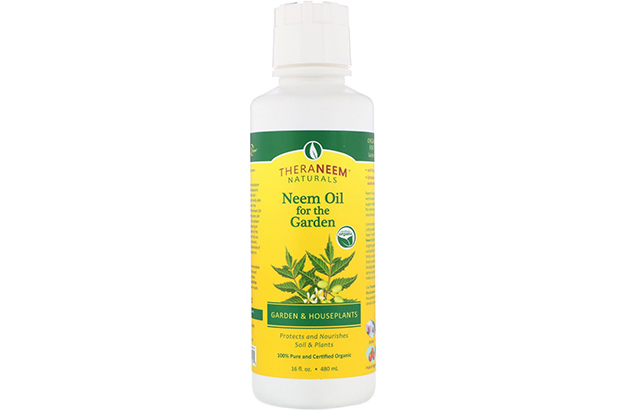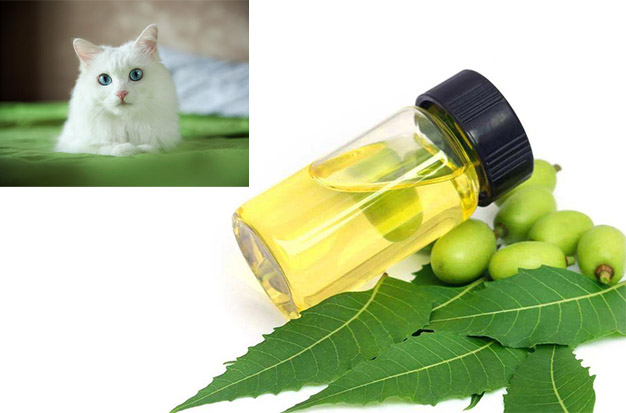Neem oil is frequently used as an insecticide, but is it harmful to cats as well? The neem tree is not on the ASPCA’s list of plants that are poisonous to cats or dogs, and neither is neem oil.
The plant’s low toxicity does not, however, imply that it is safe for routine use or suitable for all cats. Consult a veterinarian for guidance and potential substitutes before administering any novel topical treatments to your cat.
Table of Contents
What Is Neem Oil?
Neem oil is a vegetable oil that is extracted from the neem tree (Azadirachta indica) which is native to parts of Myanmar, Sri Lanka, and India. The tree is currently grown in tropical regions all over the world.
The plant’s oil is typically cold-pressed, yielding a potent oil that may be brown, red, or yellow.
The majority of the time, neem oil is made from the tree’s seeds, though other plant parts are also used in ayurvedic and traditional medicine.
Most commonly applied topically, neem oil needs to be diluted before use. It is far too powerful on its own and, when applied topically, may have negative effects.
Neem oil is typically sold as a diluted mixture, spray, shampoo, or, less frequently, as a pure oil for use on animals.
How Is Neem Oil Used?
Although neem trees are indigenous to India, Sri Lanka, and Burma, they are now grown in a number of tropical areas all over the world. The oil extracted from the tree is commonly used as a topical skin reliever, insect repellent, anti-inflammatory drug, and ringworm treatment. Without too many safety concerns, neem oil has been used as a bug repellent for horses and dogs, but cats haven’t been exposed to it as much.
The Benefits Of Neem Oil
Neem oil contains essential fatty acids and vitamin E, but its triterpenes are what give the oil some of its therapeutic benefits. Triterpenes, which can be found in both plants and animals, have antifungal, antiseptic, anti-inflammatory, and antihistamine properties and are used to treat inflammation. Neem oil’s resistance to insects is another noteworthy property of the azadirachtin compound. Despite these advantages, neem oil is not a substance that is simple to use and may not seem like a miraculous treatment for both humans and other animals. You might not want to cover your cat’s fur with the potent liquid because some people liken the oil’s smell to that of rotting garlic.
What About Cats And Neem Oil?
Neem oil is usually okay for cats as long as it is applied topically and diluted properly. In spite of this, as we shall see, some vets even have doubts about this.
Neem oil’s safety when used internally is in doubt. Neem oil use as an oral remedy has not been the subject of any studies, so there are no data on its safety.
Neem oil should be applied correctly for best results to reduce the possibility of side effects.
Neem needs to be diluted at all times when applied topically. The majority of professionals advise purchasing a diluted product.
Neem oil must always be diluted with another carrier oil, such as coconut or olive oil, if it is pure.
Neem oil should never be applied directly to your cat because it might irritate the skin.
Notably, no studies have specifically examined cats; the majority of research on the topical application of neem oil has been done on dogs, horses, and other animals.
Will Neem Oil Help Our Cats?
The most reliable use for neem oil is as a repellent. “According to McFaddin, an integrative veterinarian, neem oil can be applied topically to ward off and eradicate common biting insects like fleas, biting midges, and mosquitoes. Neem oil’s capability to deter and eliminate ticks is debatable, she continues.
Several variables affect its efficacy. “Neem oil’s antimicrobial and antiparasitic properties can vary depending on the organism it is being used to treat as well as the quantity, frequency, and length of time that it is being applied, according to Dr. California Pet Acupuncture and Wellness is run by veterinarian Patrick Mahaney in Los Angeles.
Neem oil or any other herbal remedy should not be used as a sole repellent, according to veterinarians; instead, it should be used in conjunction with more conventional preventative measures. “According to Dr., dangerous diseases like tapeworm, heartworm, Babesia, Bartonella, Lyme disease, and many others are carried by fleas, ticks, and mosquitoes. Danielle Conway, a nutrition resident at the University of Tennessee College of Veterinary Medicine in Knoxville. She adds that pet owners who choose to use neem oil as their only repellant should be diligent about routinely checking their animals for parasites. In order to prevent flea, tick, and mosquito bites in pets who are not taking a monthly medicated preventative, Dr. One Love Animal Hospital’s medical director, Katie Grzyb, practices in Brooklyn, New York. “According to her, tests will check for heartworm and tick-borne diseases. “In most cases, the simpler and less expensive the treatment, the earlier the diagnosis.”
Neem oil’s components, such as azadirachtin, Nimbin, essential fatty acids, and vitamin E, implying that it may also be useful for treating ringworm, localized demodectic mange, hot spots, soothing inflamed skin, and reducing itching, according to McFaddin. “However, there are no studies proving neem oil’s ability to effectively treat these ailments.”

How To Use Neem Oil For Cats?
Only when directed and advised by a qualified veterinarian should neem oil be applied topically.
Neem oil is commonly used to treat cats for fleas. This makes sense since the most researched aspect of the plant is its use as an insect repellant.
The majority of neem oil products will be shampoos, sprays, or diluted tinctures.
The products ought to come with guidelines for use, such as usage instructions. We do advise, though, that you consult with your veterinarian first.
Neem oil, or any other herbal product for that matter, should always be spot-tested on a small area before use.
A small patch of your cat’s skin should be treated with a small amount of the product. Once you’ve waited 24 hours, look out for any irritation or allergic reaction symptoms.
In this manner, if it does irritate your cat’s skin, it will only affect a small area.
Side Effects Of Neem Oil For Cats
Skin irritability is the most frequent adverse effect of neem oil use in cats.
When this happens, keep an eye on the area because itchy skin can easily break and become infected or develop into a hotspot if your cat licks and scratches it frequently.
If the irritation doesn’t go away quickly, consult your veterinarian.
Neem oil has occasionally produced adverse reactions like vomiting, respiratory distress, diarrhea, convulsions, lethargy, and lethargy.
Neem oil treatment for your cat may cause some of these symptoms. If this happens, contact your veterinarian right away.
The Safest Way To Use Neem For Cats
Use neem leaf on your cat; it’s that simple.
In Ayurvedic medicine, neem leaves are preferred for treating all skin conditions. Even when taken in large doses, neem leaf is completely safe. In 5000 years, no one has ever documented any negative effects or an overdose from using or ingesting neem leaf, not in humans or any animals.
On the other hand, neem oil has some toxicity when consumed in large amounts. Whether the toxicity was caused by the neem oil itself or by a contaminant in the oil is unknown. Still, I would not treat a cat with a concentrated neem oil product that’s left on the coat/skin, especially when there is a perfectly safe alternative.
- You can make your own watery neem leaf extract (neem tea) and use it as a spray or rinse.
- For enduring skin issues, make neem leaf paste from fresh or dried leaves.
- For neem products, look for ones that use neem leaf extract rather than neem oil, such as this neem pet shampoo.
Conclusion
Neem oil on your pet may be safe when used sparingly, but the risk is not worth it. Your cat would be better off staying away from mosquito-infested areas and using a heartworm prevention product up until more research has been done on the impact of the oil on felines. Online, DIY neem formulas are becoming more popular, but any homemade recipe needs to be approved by a veterinarian before it is applied to a cat. Neem oil has a variety of applications, but it is not advised to rub it on your pet’s glossy coat due to its strong odor.

